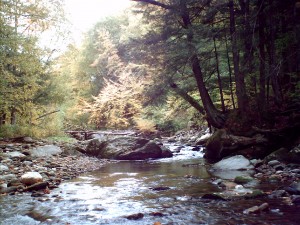Sep 29 2010
Mountain Stream Philosophizing
 Sometimes I head to the mountains to escape my thoughts. Other times I take my intellectual baggage with me. The other day was a good example of the latter.
Sometimes I head to the mountains to escape my thoughts. Other times I take my intellectual baggage with me. The other day was a good example of the latter.
Even as the rush of the mountain stream filled my ears, and the intoxicating smell of autumn leaves tickled my nose, I brooded over a comment made by a world-renowned physicist a week or two earlier. He had said that a Creator was not necessary, that the universe could have arisen spontaneously from nothing. I immediately scoffed at the notion, but it ate away at me regardless.
Order or chaos – it all comes down to that, doesn’t it? Either the universe is organized according to certain immutable laws, or all events are essentially random. Recent cosmological discoveries point to a Big Bang occurring 13.7 billion years ago, to a singular event giving birth to the universe as we know it, thereby ruling out the possibility that things are now as they have always been. But that leaves the non-religious thinker no choice but to embrace utter randomness. And that’s a tough pill to swallow.
Order or chaos? While fly fishing a mountain stream, I see plenty of both. All around me there are downed trees, rotting wood, and the quiet tumult of growth and decay, yet the leaves overhead are turning gold, completing a cycle set in motion many centuries ago. Rocks are strewn about haphazardly, as are twigs and branches, yet the stream itself follows the inexorable tug of gravity. Is wild nature ordered or chaotic? A good argument can be made either way.
A small brown trout rose to my showy fly, an Ausable Wulff, then all was quiet for a while. When I spotted a cloud of tiny, slate gray mayflies hovering over the water, I changed to another fly – one called a Blue-winged Olive – that better matched the hatch. I was betting that the hungry mouths beneath the water’s surface would know the difference. This bet didn’t escape the philosopher in me. I was betting on natural order and was not disappointed. Several trout splashed to the surface, chasing my tiny gray fly. Unfortunately, I didn’t have the eyes to see my offering on the water so I missed the strikes, leaving all matters philosophical unresolved.
Shortly thereafter, I resorted to my showy A. Wulff, which is much easier to see. I soon hooked and landed a ten-inch brook trout. It didn’t make any sense, really. You’d think a big, old brookie would know better than to rise to something that looks as out of place as an A. Wulff. Clearly Mother Nature was making fun of me, mocking my assumptions. Or maybe we just don’t have enough information to really know what’s going on around us. I laughed long and hard at that, while returning the trout to the drink. There’s always a rationalization, isn’t there?
Comments Off on Mountain Stream Philosophizing

